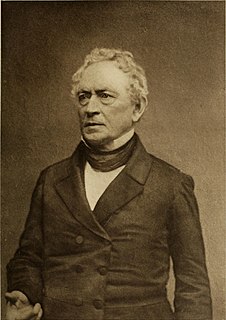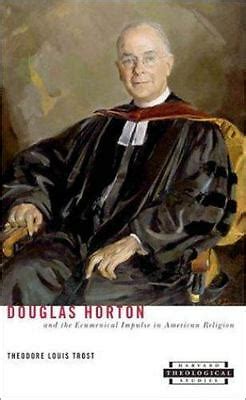A Quote by Samuel Johnson
Sir, sorrow is inherent in humanity. As you cannot judge two and two to be either five, or three, but certainly four, so, when comparing a worse present state with a better which is past, you cannot but feel sorrow. It is not cured by reason, but by the incursion of present objects, which bear out the past.
Related Quotes
Past, n. That part of Eternity with some small fraction of which we have a slight and regrettable acquaintance. A moving line called the Present parts it from an imaginary period known as the Future. These two grand divisions of Eternity, of which the one is continually effacing the other, are entirely unlike. The one is dark with sorrow and disappointment, the other bright with prosperity and joy.... Yet the Past is the Future of yesterday, the Future is the Past of to-morrow. They are one-the knowledge and the dream.
My concern today is with the painting of manners of the present. The past is interesting not only by reason of the beauty which could be distilled from it by those artists for whom it was the present, but also precisely because it is the past, for its historical value. It is the same with the present. The pleasure which we derive from the representation of the present is due not only to the beauty with which it can be invested, but also to its essential quality of being present
True forgiveness deals with the past, all of the past, to make the future possible. We cannot go on nursing grudges even vicariously for those who cannot speak for themselves any longer. We have to accept that we do what we do for generations past, present and yet to come. That is what makes a community a community or a people a people-for better or for worse.
Originally the structure was . . . a modern narrator who would appear intermittently and talk about his memories of his grandmother, which would then be juxtaposed against scenes from the past. But the stories from the past were always more interesting that the things in the present. I find this almost endemic to modern plays that veer between past and present. . . . So as we've gone on developing GOLDEN CHILD, the scenes from the past have become more dominant, and all that remains of the present are these two little bookends that frame the action.
The evil, Sir, is enormous; the inevitable suffering incalculable. Do not stain the fair fame of the country. . . . Nations of dependent Indians, against their will, under color of law, are driven from their homes into the wilderness. You cannot explain it; you cannot reason it away. . . . Our friends will view this measure with sorrow, and our enemies alone with joy. And we ourselves, Sir, when the interests and passions of the day are past, shall look back upon it, I fear, with self-reproach, and a regret as bitter as unavailing.
Now, everybody knows the basic erogenous zones. You got one, two, three, four, five, six, and seven. ... OK, now most guys will hit one, two, three and then go to seven and set up camp. ... You want to hit 'em all and you wanna mix 'em up. You gotta keep 'em on their toes. ... You could start out with a little one. A two. A one, two, three. A three. A five. A four. A three, two. Two. A two, four, six. Two, four, six. Four. Two. Two. Four, seven! Five, seven! Six, seven! Seven! Seven! Seven! Seven! Seven! Seven! Seven! Seven! Seven! [holds up seven fingers]
These tenses-past, present and future-are not the tenses of time; they are tenses of the mind. That which is no longer before the mind becomes the past. That which is before the mind is the present. And that which is going to be before the mind is the future. Past is that which is no longer before you. Future is that which is not yet before you. And present is that which is before you and is slipping out of your sight. Soon it will be past.
I am interested in the past. Perhaps one of the reasons is we cannot make, cannot change the past. I mean you can hardly unmake the present. But the past after all is merely to say a memory, a dream. You know my own past seems continually changed when I am remembering it, or reading things that are interesting to me.
The science of meditation: it brings you to the present, it brings you to this moment. The past is a thought; it disappears when thoughts disappear. The future is also a thought; it disappears when you drop thinking. When you are in a state of no-thought - there is no past, no future, there is only the present - in that state of no-thought you are ONE, in tune with God. And suddenly the flood is there: you are flooded with light, with love, with grace. You are no more a man, you are divine. You have surpassed humanity. Humanity is in a state of deep sleep.
Critical acumen is exerted in vain to uncover the past; the past cannot be presented; we cannot know what we are not. But one veilhangs over past, present, and future, and it is the province of the historian to find out, not what was, but what is. Where a battle has been fought, you will find nothing but the bones of men and beasts; where a battle is being fought, there are hearts beating.





































